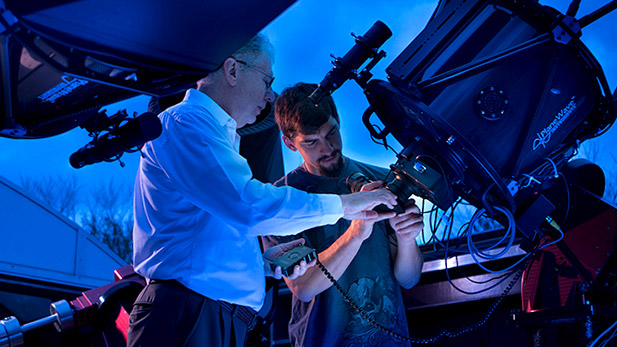After 35 Years of Exploring the Skies, Ditteon Sets His Eyes on Retirement

Richard Ditteon is retiring at the end of the fall academic quarter after a 35-year tenure as an award-winning professor of physics and optical engineering. He also is the founding director of the Oakley Observatory.
A sparkle appears in Richard Ditteon’s eyes whenever the conversation turns toward Rose-Hulman’s Oakley Observatory. That’s not surprising since the facility on the east side of campus may be the crown jewel of his productive and award-winning 35-year tenure with the institute’s faculty. That educational career is ending in retirement at the conclusion of the fall academic quarter.
Opening its roof for the first time on April 11, 2000, the observatory allows students and faculty to explore their celestial interests. Its state-of-the-art telescopes also have opened the skies to other members of the campus community, Wabash Valley residents and a variety of school groups.
“People are interested in the world that’s around them. It’s breathtaking,” Ditteon says.
That group once included a boy from Anderson, Indiana, who in the third grade made a notebook with all of the planetary data he could find. That interest in astronomy came at the pinnacle of America’s space exploration efforts and he arrived at Rose-Hulman to study physics as NASA’s Apollo program had astronauts exploring the moon’s surface.
When not studying, Ditteon could be found at Rose-Hulman’s original campus observatory, which had been built to participate in the Smithsonian Astrophysical Observatory’s Moonwatch program. Amateur astronomers across the country visually tracked the first satellites in the days before radar and automated tracking systems.
After graduating in 1974, Ditteon went on to earn a doctorate in geophysics and space physics from UCLA. At the nearby Jet Propulsion Laboratory, he analyzed thermal mapper data collected by NASA’s Viking mission to Mars in order to characterize afternoon cooling on the planet. He also worked for the Aerospace Corporation, analyzing data returned from infrared instruments.
Ditteon’s interest in astronomy and physics made him a natural to join the faculty of Rose-Hulman’s new optics program in 1984, and become director of the Lynn Reeder Observatory in 1992. Soon thereafter, he expressed concern about the future of the astronomy program when a campus strategic master plan had the observatory being razed to make room for a residence hall parking lot.
“I knew that our aspirations to become the best undergraduate school in engineering, science and math wouldn’t be achievable without an observatory. I just needed to get others to realize that fact,” Ditteon recalls.
Fortunately, 1949 alumnus Gene Glass, an amateur astronomer, shared Ditteon’s vision for the institute’s astronomy program. He donated funds for new, user-friendly equipment that would better allow students to explore the open skies. The Student Government Association followed by supporting the Astronomy Club’s purchase of a new telescope, and the National Science Foundation, encouraged by the increased student interest, provided additional funds for new equipment.
But the astronomy program still needed a new home. That came when the Hollie and Anna Oakley Foundation, Inc. of Terre Haute provided a grant to support the construction of the current observatory and, seven years later, the establishment of the sister observatory in Australia. The foundation also has provided funding to provide new telescopes and other equipment for the observatories.
“The only reason we have an observatory is because the students wanted it,” acknowledges Ditteon, the observatory’s founding director. “Really, the observatory and the astronomy program are inseparable, you can’t have one without the other. Fortunately, we have provided the facilities that have allowed our students to explore their interests in astronomy.”
Students have discovered and named several asteroids, measured the brightness of main belt asteroids and earned prestigious Goldwater Scholar honors for their undergraduate research activities. Several students have been encouraged by Ditteon to attend graduate- and doctorate-degree programs.
“Students drove my passion. I wanted to share the universe with them,” Ditteon says.
Physics and Optical Engineering Department Head Galen Duree refers to Ditteon as “the shining star of Rose-Hulman’s astronomy program.” His colleagues across campus agree wholeheartedly.
Ditteon is one of Rose-Hulman's most decorated educators. He earned the Board of Trustees Outstanding Scholar Award for his research activities, has been the Herman A. Moench Distinguished Professor of Physics and Optical Engineering for several years, and was recognized with the Alumni Association’s Honor Alumni award. He also has served as director of the Operation Catapult summer STEM program for rising high school seniors, co-founded the Accelerated Math Physics program for incoming first-year students and was a charter member of Rose-Hulman’s Pi Kappa Alpha fraternity chapter.
“Ever since I stepped on campus to attend Operation Catapult myself, Rose-Hulman has been a special place for me and my family. The observatory has been a second home for me and has allowed me to make special connections with students that have gone beyond the classroom,” he says. “We’re blessed to have one of the best college teaching observatories in the country. I’m really proud of that fact.”